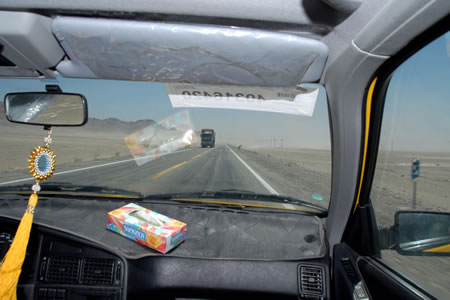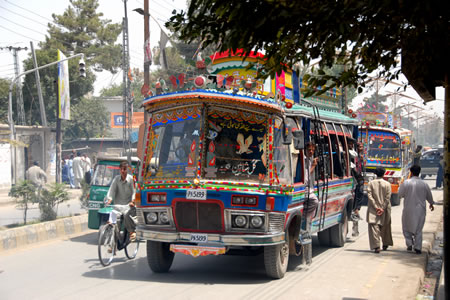English | Dutch |
|
| From Zahedan to Quetta | |
Quetta (Pakistan), August 3rd 2007 |
|
We have taken the bus from Kerman to Zahedan (South-East Iran) that takes approximately seven hours. We have the plan to arrange our Indian visa at the Indian consulate in the city of Zahedan. We first thought about doing that in Islamabad (Pakistan), but decided to have the Indian visa already in Iran. Just in case the safety situation in Pakistan changes dramatically, meaning that we want to leave Pakistan as soon as possible. Our travel book told us that it would take three working days to arrange the Indian visa in Zahedan. We will not stay in Zahedan these three days, but will travel ‘back’ to the historical town of Bam, that is hit by a devastating earthquake in December 2003 (result: 26,000 deaths). At least, this is our plan. Zahedan is a non-inspiring city, close to the borders of both Pakistan and Afghanistan. Because of the huge amounts of drugs that are smuggled through this area (from Pakistan and Afghanistan, via Iran to Europe), it is not safe on the streets after dark. Our goal is to submit our papers at the Indian consulate and leave Zahedan as soon as possible. Finding a hotel in Zahedan is not easy. The first couple of hotels sent us back right away with the argument that the hotel is full. But when we look to the closet in where they keep the keys of the rooms, it looks like the hotels are almost empty. They probably do not want the hassle of foreign guests. Just before sunset we find a small hotel that accepts us. It is located in the western part of town. Exactly, it is the least safe part of town. The hotel wants to register us immediately at the police. They want that the police are aware of the fact that we are staying at the hotel. The hotel also asks us not to enter the streets after sunset without an escort. When we ask for the reason for all the precautions, we get an answer in for us non-understandable Farsi. The only word we understand is: Taliban. Fortunately there is a restaurant next to the hotel, which means that we can stay away from the street. |
|
 |
|
On the road from Zahedan to the Pakistan border. |
|
The next day we are early at the Indian consulate. It is quite at the consulate which means that they have plenty of time to talk to us. Soon it seems that we have a problem. Because of the holiday leave of the consul, they can not issue visas after three days, but after probably ten days. And because our Pakistan visa has a remaining validity (to enter the country) of twelve days, we take a huge risk. If the Indian visa is delayed, we lose our Pakistan visa. And getting a Pakistan visa in Iran is not easy, because we need a recommendation letter from the Dutch embassy in Tehran (which is 1570 km back!). This means that our options are reduced, unless we choose to skip Pakistan and fly from Tehran to India. Because of the high cost, the only reasonable alternative is to travel as soon as possible to Pakistan, and arrange the Indian visa in Islamabad. If we tell the Indian consulate about our concerns about the security in Islamabad (bombings as result of the charges at the Red Mosque in Islamabad), he does not agree with us. He has a very simple argument: “Islamabad is the capital city of Pakistan. If they (Pakistan government) lose control over this city, they lose control over the country. The will do everything to prevent this”. In his opinion, the capital is safe. Despite the fact that we do not believe in his theory, we are on the way to the Pakistan border within an hour. We do not want to lose any time and have no reasons to stay longer in Zahedan. Besides that, we want to cross the border by daylight for security reasons. The trip to the border (less than 100 km from Zahedan) is spectacular. It is dry, hot and windy. Once in a while the taxi has to reduce its speed to 30 km/hour because the blowing sand reduces the sight to almost zero. We pass a heavy armed military check post where the military people use shawls before their faces to stand the sand storm. When we arrive at the border, the wind is fortunately reduced. We pass the Iranian emigration easily and also the Pakistan immigration is efficient. After a short talk with the Pakistan customs we get the reassuring words: “You are free now”. That means that we are officially in Pakistan. | |
 |
|
Art on wheels in the centre of Quetta . |
|
| After all the formal procedures we take a pick up to the small village of Taftan, from where the busses leave to Quetta (the first big city in Pakistan after crossing the Iranian-Pakistan border). Taftan is sometimes also called the hell on earth. If hell looks like Taftan, it is indeed not a great place to be. It is extremely hot, dusty, it lacks vegetation and because of the winds (resulting is dust) it is a very uncomfortable place. We have to wait two and a half hours before we can leave hell. And that is also hell, because the journey to Quetta takes 12 hours on a bumpy road, which makes it impossible to sleep. The bus leaves finally at half past six in the afternoon, after some problems with the essential air-conditioning in the bus.
The first two hours of the trip are comfortable, also because of the daylight which means that we can enjoy the desolate the environment. Sometimes we pass a small village. We really do not understand why people live here. There is really nothing else than sand, rocks and an annoying wind. When it gets dark, we still have ten hours to go. We spent the time by chatting, eating pistachios and snooze once in a while. When the bus makes an emergency brake, we almost smash to pieces against the chair in front of us. In front of the bus is a dromedary with its young standing confused in the lights of the bus. After the dromedary left the road, we drove further into the night. By the way, we have a very good chauffeur. He drives the whole twelve hours without being replaced by a fellow driver. When you ask somebody if it is safe, you get one standard answer: “Mashallah!” (if it is Gods will). | |